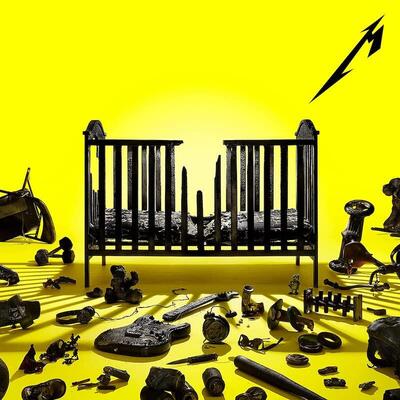Wanted to sit with this during the six weeks since its release. Worth the soak.
You never had so much fun listening to music about childhood trauma. James Hetfield's gotta sing about something, and it might as well be something that gets him howling hard: the demons of addiction, the menace of suicide, the "violence inheritance," the scourge of self-pity. The dude's a bit of a poet, god help him, and getting better as he gazes deeper.
The afflictions would have left only ugly boils instead of badass scars if Hetfield hadn't always channeled the pain into music, first as a young listener and then as a player. "72 Seasons" (life's first 18 years) drops many a hint as to what Hetfield and Metallica's other members were spinning as kids.
Long past the need to fulfill expectations, Metallica can create whatever the f*ck they want, yet a tiny jar of pander lingers in the pantry. The band claimed to be shocked when fans perceived the raging "Lux Aeterna," the first single from "72 Seasons" half a year ago, as a throwback to their thrash roots (it was), when the rest of the album's much slower tempos reveal the fastball as a deliberate diversion.
What Metallica really craved, during and after Covid, was an old-fashioned Irish jailbreak, Thin Lizzy style, before the dawn of Iron Maiden. The cover says it: a broken, empty crib; the baby/prisoner has ESCAPED into music. We hear Lizzyesque twin-guitar harmonies on the luxury-thrash numbers such as the title track and "Room of Mirrors." There's a swell Irish sailor section in "Chasing Light," and the whole concluding 11-minute "Inamorata" could have been a dirge from a funeral during the Troubles.
Though its lyrics skew dark, this record grooves like the boogie '70s, with drummer Lars Ulrich's thumping drums, bassist Robert Trujillo's ultralow bass (you can hear it!) and Hetfield's rich-toned rhythm guitar reaping the payoff of experience and maturity by actually seeming relaxed. The combination of psychiatrist couch and bar band even yields yoks at times as in "Screaming Suicide," wherein the guitar solo pulls a full-on quotation from Deep Purple's 1970 "Speed King." Speed kills, get it?
Lead guitarist Kirk Hammett admits that most of his solos on "72 Seasons" were improvisations intended to mark where he would craft the real solo later, but the gang dug the spontaneity, which fit in with the overall masquerade of bros just jamming together, a notion reinforced by three tracks that end with the guys tossing out random studio comments. Sometimes Hammett's spillage works, as on the chordal-torture, wah and bend on "Inamorata," the album's best track, which also features a damned guitar orchestra and some great-sounding cymbals. Other times, as on the otherwise excellent "Shadows Follow" and "Too Far Gone," Hammett's solos can come off as pasted-on or rote, but what the hell, they rock. And love that wah-wah.
Mainly, this album loads up a cornucopia of good riffs from not only Hetfield and Hammett, but Trujillo, who's credited on three tracks. Here's a nice intro for ya, plus some changes in the middle, and maybe we'll even write an entirely different riff for the end! Metallica pull this off without sounding "progressive," à la ". . . And Justice for All"; it's more like the songs develop naturally, and you hardly even notice when Ulrich switches from a humpa thrash beat to the straight 4/4 he's located inside it. Guitars blend and bleed out of each other, and for the first time in a Greg Fidelman production, the texture is three-dimensionally satisfying.
The illusion of all this ease required an enormous amount of, uh, Met-iculous effort and time, but "72 Seasons" suggests that Metallica will enjoy playing as a band on their current tour more than ever. Here's hoping we're not stuck with just bootlegs.
* * *
Read MetalJazz's review of Metallica's 2016 album, "Hardwired . . . To Self-Destruct," here, and their 2008 album, "Death Magnetic," here.

